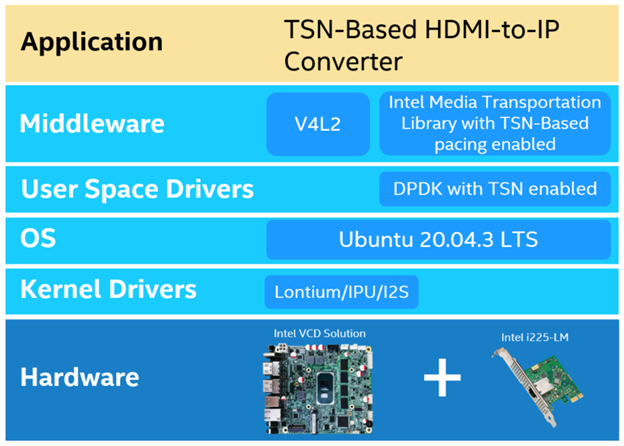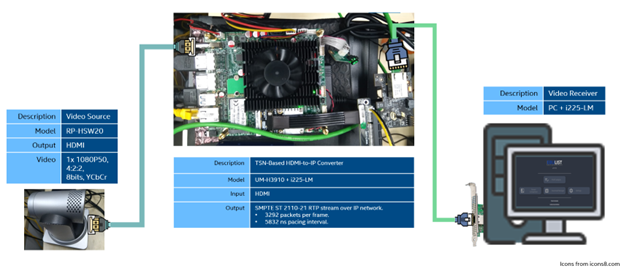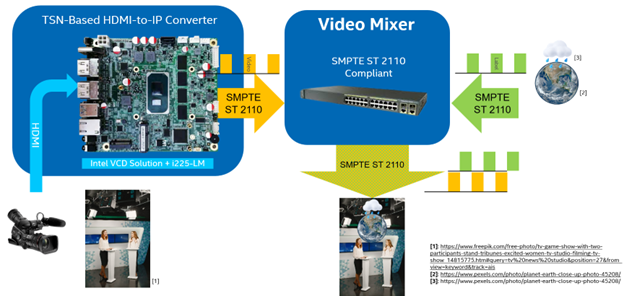Overview
Implements a SMPTE ST 2110 compliant HDMI-to-IP Converter based on Intel® Media Transport Library, Intel® Core™ Processors based Video-Capture-Design Solution and Intel® Ethernet Controller I225. The HDMI-to-IP Converter reads signal from HDMI-IN port and output YUV video stream over IP network. By leveraging Time Sensitive Networking feature of Intel® Ethernet Controller I225, it archives SMPTE ST 2110-21 narrow type sender require precision.
Select Configure & Download to download the sample.
- Time to Complete: 8 hours
- Available Software: DPDK*
Prerequisites
- Complete setup and test steps as below:
- Follow steps to enable Video-Capture-Design (VCD) solution here
- Click on Download link under tab Content Details
- Once after setting up the target system, user to add below boot options:
iommu=pt intel_iommu=on hugepages=2048 rdt=!l3cat,!l2cat efi=runtime art=virtallow clocksource=tsc tsc=reliable no_ipi_broadcast=1 nosoftlockup idle=poll audit=0 nmi_watchdog=0 irqaffinity=0 noht isolcpus=1-3 rcu_nocbs=1-3 nohz_full=1-3 intel_pstate=disable intel.max_cstate=0 intel_idle.max_cstate=0 processor.max_cstate=0 processor_idle.max_cstate=0 vt.handoff=7
- Follow Get Started section for next steps
How It Works

Figure 1: Overview Diagram
Time Sensitive Networking-Based HDMI-to-IP Converter is a SMPTE ST 2110 compliant device based on Time Sensitive Networking (TSN) technology. Because time synchronization and traffic shaping are common to both the SMPT ST 2110 and the TSN standards, TSN technology can be used for SMPTE ST 2110 implementation.

Figure 2: Architecture Diagram
Intel® VCD Solution : Intel® Core™ Processors based Video-Capture-Design Solution.
The Recommended Hardware is an example.
Intel® i225-LM is discrete ethernet solutions w/ RTOS and Linux deliver the benefit of AVB/TSN capabilities. Supports Audio Video Bridging (AVB) /Time-Sensitive Networking (TSN) specifications. These standards provide networking features for time-sensitive applications.
Lontium/IPU/I2S implements the video pipeline setup, device configuration and IO control for LT6911UXC integrated with V4L2 framework and ALSA framework.
DPDK with TSN enabled provides a set of data plane libraries and network interface controller polling-mode drivers for offloading TCP packet processing from the operating system kernel to processes running in user space. It already supports TSN features based on igc driver.
Intel® Media Transportation Library with TSN-Based pacing enabled is a DPDK-based solution designed for high-throughput, low-latency transmission and reception of media data. It features an efficient user-space LibOS UDP stack specifically crafted for media transport, and comes equipped with a built-in SMPTE ST 2110-compliant implementation for Professional Media over Managed IP Networks. The latest version supports nanosecond precision pacing based and time synchronization on TSN technology.
Get Started
Select Configure & Download to download the sample.
- Install the package
Install required packages using below commands:
sudo apt-get install git gcc meson python3 python3-pip pkg-config libnuma-dev libjson-c-dev libpcap-dev libgtest-dev libsdl2-dev libsdl2-ttf-dev libssl-dev libgmp-dev
sudo pip install pyelftools ninja
- Get the source code
Run below commands:
cd ~
git clone https://github.com/OpenVisualCloud/Media-Transport-Library.git
export imtl_source_code=${PWD}/Media-Transport-Library
cd ~
git clone https://github.com/DPDK/dpdk.git
cd dpdk
git checkout v23.03
git switch -c v23.03
git am $imtl_source_code/patches/dpdk/23.03/*.patch
git am $imtl_source_code/patches/dpdk/23.03/tsn/*.patch
Two folders will be created under user home directory after executing above steps. One is named Media-Transport-Library. The other is named dpdk. Both folders contain source files.
- Build and install DPDK
Run below commands:
meson setup ~/build/dpdk
ninja -C ~/build/dpdk
sudo ninja install -C ~/build/dpdk
One folder will be created under user home directory after executing above steps. It is named build/dpdk. The folder is the build folder of DPDK.
- Build TSN-Based HDMI-to-IP Converter
Run below commands
cd $imtl_source_code
./build.sh
One folder will be created under ~/Media-Transport-Library after executing above steps. It is named build. The folder is the build folder of TSN-Based HDMI-to-IP Converter.
Run the Application
- Connect all machine according by below figure
Figure 3 shows the scenarios to run the application.

Figure 3: Run TSN-Based HDMI-to-IP Converter
Video Source is a device output video frames over HDMI, for example camera, PC etc.
TSN-Based HDMI-to-IP Converter is an Intel® VCD solution + Intel® i225-LM platform running the TSN-based HDMI-to-IP Converter program. The program reads video frames from HDMI-IN port, can convert the video frames to SMPTE ST 2110 compliant RTP stream.
Video Receiver is a PC. It runs tcpdump program to capture receiving RTP packets and analyzes the SMPTE ST 2110 compliant of RTP stream. It also acts as a master clock for PTP.
TSN-Based HDMI-to-IP Converter and Video Receiver are connected directly over Intel® i225-LM. The $CONNECT_INF in below steps is interface name of Intel® i225-LM.
- On Video Receiver, optimize network stack
Run below commands
cd $imtl_source_code
./build.sh
- On Video Receiver, start PTP master clock
Run below commands
sudo ptp4l -i $CONNECT_INF -4 -l 6 -m --logSyncInterval -3 --tx_testamp_timeout 1000 --socket_priority 7 &
sudo phc2sys -c $ CONNECT_INF -s CLOCK_REALTIME -O 0 -l 6 -m &
- On TSN-Based HDMI-to-IP Converter, check device ID of Intel® Ethernet Controller I225-LM
Run below commands
sudo lspci | grep 15f3
Find the device ID, for example “0000:01:00.0”, from below output:
01:00.0 Ethernet controller: Intel Corporation Device 15f3 (rev 03)
If above output is not shown, run below commands:
sudo lspci | grep I225
Find the device ID, for example “0000:01:00.0”, from below output
01:00.0 Ethernet controller: Intel Corporation Ethernet Controller I225-LM (rev 03)
- On TSN-Based HDMI-to-IP Converter, bind Intel® Ethernet Controller I225-LM to DPDK igc driver
Run below commands
cd $imtl_source_code
sudo ./script/nicctl.sh bind_pmd 0000:01:00.0
- On TSN-Based HDMI-to-IP Converter, initiate Lontium/IPU/I2S
Run below commands
sudo media-ctl -r
sudo media-ctl -v -V "\"lt6911uxc a\":0 [fmt:UYVY/1920x1080]"
sudo media-ctl -v -V "\"Intel IPU6 CSI-2 1\":0 [fmt:UYVY/1920x1080]"
sudo media-ctl -v -V "\"Intel IPU6 CSI2 BE SOC\":0 [fmt:UYVY/1920x1080]"
sudo media-ctl -v -l "\"lt6911uxc a\":0 -> \"Intel IPU6 CSI-2 1\":0[1]"
sudo media-ctl -v -l "\"Intel IPU6 CSI-2 1\":1 -> \"Intel IPU6 CSI2 BE SOC\":0[5]"
sudo media-ctl -v -l "\"Intel IPU6 CSI2 BE SOC\":16 -> \"Intel IPU6 BE SOC capture 0\":0[5]"
- On TSN-Based HDMI-to-IP Converter, start TSN-Based HDMI-to-IP Converter program
Run below commands
sudo ./build/app/V4l2toIPApp /dev/video51 --log-status --ptp –tsn
After “MT: PTP(0): system clock offset max 259, synchronized” of below output presents, the SMPTE ST 2110 compliant RTP stream transmission starts:
MT: * * M T D E V S T A T E * *
MT: DEV(0): Avr rate, tx: 1743.150045 Mb/s, rx: 0.017576 Mb/s, pkts, tx: 1646228, rx: 245
MT: CNI(0): eth_rx_rate 0 Mb/s, eth_rx_cnt 245
MT: PTP(0): time 1692904264838671714, 2023-08-24 19:10:27
MT: PTP(0): system clock offset max 259, synchronized
MT: PTP(0): delta avg 3, min -12, max 11, cnt 138
MT: PTP(0): correct_delta avg 25744798125, min -169289497586, max 60530855505, cnt 80
MT: PTP(0): path_delay avg 1413, min 1410, max 1416, cnt 80
MT: PTP(0): mode l4, sync cnt 80, expect avg 1:0@0.124482s
MT: PTP(0): rx time error 0, tx time error 0, delta result error 58
MT: TX_VIDEO_SESSION(0,0:v4l2_st20_tx): fps 49.991044, frame 500 pkts 1646200:1646199 inflight 407057:411550
MT: TX_VIDEO_SESSION(0,0): throughput 1742.887329 Mb/s: 0.000000 Mb/s, cpu busy 0.000000
MT: * * E N D S T A T E * *
- On Video Receiver, start tcpdump to capture RTP packets
Run below commands
chrt -f 90 tcpdump -w /tmp/rtp.pcap -p -s 1350 -B 4096 -tt -nn \
--time-stamp-precision=nano --time-stamp-type=adapter_unsynced -e -xa \
-c 40000 -i $ CONNECT_INF "udp and port 50000"
The command will generate file “rtp.pcap” under /tmp folder. The file contains 40000 RTP packets.
- On Video Receiver, unload the /tmp/rtp.pcap to EBU LIST to analyze SMPTE ST 2110 compliant of receiving RTP stream
Figure 4 shows expected result:

Figure 4: Expected EBU LIST Result
Build a Solution Based on the Product
Figure 5 shows a professional media broadcast solution. TSN-Based HDMI-to-IP Converter acts as one source of media. There are other sources, for example, label etc. Multiple source streams aggregate at the Video Mixer to composite final video. Because all streams are SMPTE ST 2110 compliant, their transmission intertwine and keep well synchronization.

Figure 5: Professional Media Broadcast Solution
Summary and Next Steps
You have successfully built a SMPTE ST 2110 compliant HDMI-to-IP Converter based on Intel® VCD solution and TSN technology.
As a next step, try the following :
- Panorama video from multiple cameras.
- Project a HDMI video source to a display wall.
Support Forum
If you're unable to resolve your issues, contact the Support Forum.